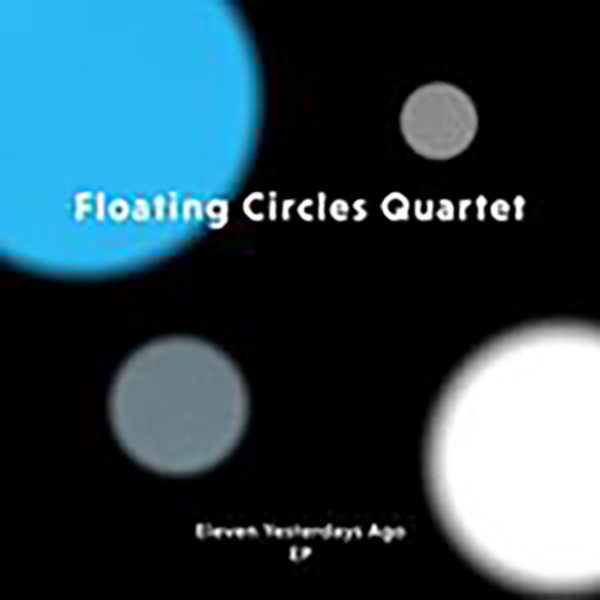
by Ian Mann
July 23, 2018
/ EP
It’s good to hear the clarinet being used in this very contemporary context and this EP bodes well for the quartet’s future.
Floating Circles Quartet
“Eleven Yesterdays Ago”
(Self Released Digital EP)
Aidan Pearson – clarinet
Dom Stockbridge – guitar
Jonny Wickham – bass
Arthur Newell - drums
Floating Circles Quartet is a new, young group led by London based clarinettist and composer Aidan Pearson.
A musician with a foot in both the jazz and classical music camps Pearson studied jazz at London’s Guildhall School of Music where his tutors included saxophonists Martin Speake and Martin Hathaway, flautist Gareth Lockrane and pianist Malcolm Edmondstone. Among the ensembles with which Pearson has played are Tomorrow’s Warriors, led by bassist Gary Crosby, and the Southbank Sinfonia.
As a sideman, sometimes also playing saxophone, Pearson has played at many of London’s leading jazz venues with musicians such as pianist Peter Edwards, rising star guitarist Rob Luft and big name Americans Marcus Roberts (piano) and Jason Marsalis (drums).
As a composer Pearson has written for classical ensembles ranging from wind quartet to full orchestra in addition to writing for jazz groups. He is the sole composer for Floating Circles Quartet, the line up of which also features Dom Stockbridge on guitar, Jonny Wickham on double bass and Arthur Newell at the drums.
Of the four only Newell has appeared on the Jazzmann web pages before, this when he played on the recent album release “Anecdotes II” by bassist and composer Matthew Read’s trio. Pearson, Read and Newell were all at the Guildhall together and it was my review of Read’s album that prompted Pearson to get in touch with me with a view to my reviewing the début release from Floating Circles Quartet. In the meantime my review of “Anecdotes II” by the Matthew Read Trio can be read here;
http://www.thejazzmann.com/reviews/review/matthew-read-trio-anecdotes-ii/
The début recording from Floating Circles Quartet is a four track EP titled “Eleven Yesterdays Ago” which will be released shortly and will be available via Soundcloud and Bandcamp.
Pearson describes his group as a jazz/ambient quartet and cites Mammal Hands, Andy Sheppard and Brian Eno as sources of inspiration. I’ve been lucky enough to listen to the music in advance of the official release date and although I can see where Pearson is coming from with that comment none of these influences is particularly overt. Instead Floating Circles Quartet have already created their own distinctive sound, one that draws on jazz, classical, folk and even rock influences. Their music is laid back and self effacing, unforced, unhurried and unmistakeably English.
The EP commences with the seven and a half minute “Always We Can Meet” which begins with an unaccompanied guitar intro before evolving slowly and organically with Stockbridge’s gently circling, pointillist guitar motifs combining effectively with Wickham’s bass and Newell’s understated but agile drumming to create subtly interlocking rhythms above which Pearson’s clarinet is free to soar. Pearson’s clarinet sound is pure and light, sometimes almost sounding like a flute (possibly Lockrane’s influence) or a soprano saxophone. As he floats above the delicate lattice of rhythms generated by his colleagues I’m reminded of the role of Jack Wyllie’s saxophone in Portico Quartet, albeit in a more pastoral setting. The inventive and versatile Stockbridge later takes over the reins with a succinct guitar solo.
The second piece, “Distrait Mountaineer” is of similar duration and introduces itself in atmospheric fashion with Pearson’s unaccompanied clarinet quickly joined by Stockbridge’s spacey guitar and Newell’s cymbal shimmers. With Stockbridge deploying his guitar effects subtly and effectively the piece retains its other worldly feel throughout, even during the relatively conventional guitar and clarinet solos that follow.
At a little over two and a half minutes in length the title track is much more concise and is positively jaunty in comparison. The piece commences with a lively and melodic dialogue between Pearson and Stockbridge before the rhythm joins in, keeping the grooves sparse and simple with Newell deploying brushes. Pearson solos briefly with Stockbridge’s guitar later coming to the fore for an even shorter cameo. It’s all very charming, but over far too soon.
The final piece, “Grandfather’s Clock”, commences with a solo guitar intro, with the echoey twang of Stockbridge’s atmospheric playing recalling Bill Frisell. Pearson’s clarinet playing deploys both the earlier flute like tones and a deeper, woodier sound of the kind more often associated with jazz. Nevertheless it’s still a million miles from New Orleans, or even Acker Bilk. Wickham’s melodic double bass is given a moment in the spotlight while Newell’s neat cymbal work combines with the guitar to approximate the sound of the workings and chimes of the titular clock’s mechanism.
It’s been a bit weird for me reviewing this music from a series of Soundcloud links rather than the usual CD but there is much to enjoy here. Pearson has developed an unusual and very personal sound on clarinet and he’s given excellent and highly sympathetic support by the other members of the Floating Circles Quartet. Stockbridge has absorbed the influence of Frisell, Rosenwinkel and others, while Newell impresses throughout, particularly with his exquisite cymbal work.
I found the group’s music absorbing and often beautiful, though I can appreciate that there are some listeners who may find their undemonstrative ‘chamber jazz’ approach a little bloodless. For me, it’s good to hear the clarinet being used in this very contemporary context and this EP bodes well for the quartet’s future. I’d certainly welcome the opportunity of seeing them play this music live, but suspect that at this point in their career they rarely play outside London. Let’s hope that the release of this EP helps to spark a wider interest in the band across the UK as a whole.
blog comments powered by Disqus